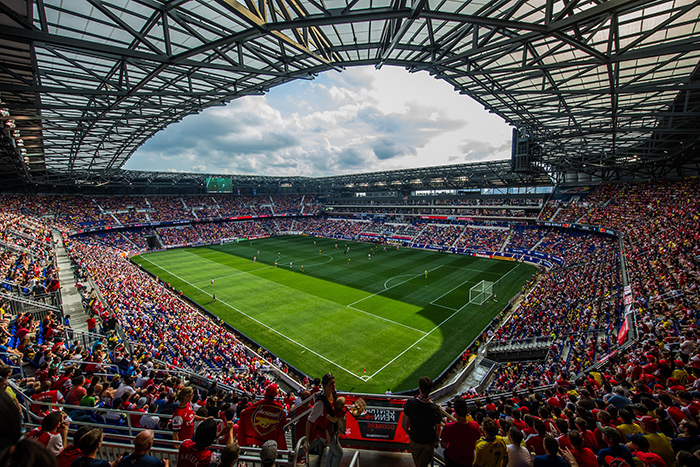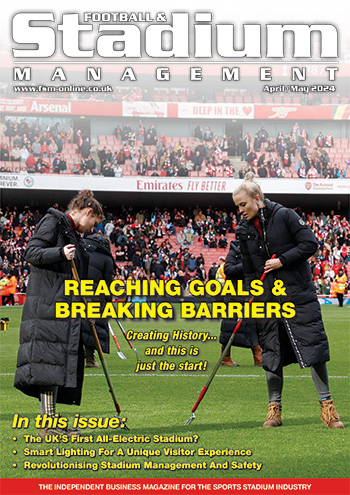NHS Covid Pass Hoped To Be The Key To Capacity Crowds
 It is anticipated that the ‘NHS Covid Pass’ will prove itself to be the key by which sport will finally be able to open its doors to capacity crowds.
It is anticipated that the ‘NHS Covid Pass’ will prove itself to be the key by which sport will finally be able to open its doors to capacity crowds.
The Covid Pass, which can be accessed through the NHS app, is set to be tested at Euro 2020 and Wimbledon and will also save some of the summer sporting calendar events from July 19th when it is expected restrictions will be lifted.
The pass, which has been the subject of intense debate in government, will be tested at Wimbledon, where there will be capacity crowds for the finals on Centre Court and at four Euro 2020 matches at Wembley, when 40,000 fans will be allowed to attend.
In July this ‘Covid Pass’ will also be trialled at other nationally significant sports events, namely, the Formula One Grand Prix at Silverstone, The Open golf at Royal St George’s, a number of England cricket matches and the Rugby League Challenge Cup Final where, it is expected significantly large crowds will attend.
Providing these test events prove to be managed correctly, are successful and no further major concerns are raised as a result, it is expected that football grounds will be given the green light to fully open. This will, however, require further work by the football authorities to streamline the process to be used en masse.
Only seven English football grounds have a capacity of more than 50,000, with the exception of Wembley, and they are all in the Premier League.
The Covid Pass, which went live this week for the various ‘pilot’ events, is available through the NHS app, and has been modified so it can now show that a person has had both doses of the vaccine jab, a recent negative test or has had the virus in the last six months.
Currently, only sports fans participating in the pilot events, like Wimbledon, can upload their test results. Ticket-holders are given a code that will allow them access to a new section of the app.
The Government has ruled out making it compulsory for venues to force people to share their coronavirus status. Instead, they are concentrating on giving organisers the option of asking fans to use the NHS Covid Pass so big sporting events can go ahead safely.
This is intended to address concerns over discriminating against people who choose not to, or cannot, receive the vaccine. Those people can take a test to prove they are Covid free.
The development of the Covid Pass is hugely significant for opening up large sporting events.
A Whitehall source is reported as stating that as the fans make some of our greatest sporting moments truly special, the NHS Covid Pass will help to safely unlock capacity crowds at the Euros and Wimbledon and hopefully will deliver a fantastic summer of sporting success.
In April, Wimbledon, the Lawn Tennis Association, England and Wales Cricket Board, Silverstone, Rugby Football Union, Rugby League and the Premier League, EFL and FA wrote to Boris Johnson and party leaders telling them that Covid passports were essential for the return of capacity crowds to sport.
That position has not changed and last month, Premier League executive director Bill Bush told MPs that some form of Covid Pass was still needed to end the ‘torture’ of no fans.
However, realistically football, and other sports, fear that even when restrictions are finally lifted and social distancing is relaxed, there may still be anxiety around very large crowds together with concerns of another surge of coronavirus in the autumn and winter, prompting the use of Covid passports at stadiums with capacities above 20,000 where fans congregate on the approach to games and also use public transport.
With the severe losses suffered by many football clubs as a result of the pandemic, Covid Passes are considered a necessary step if it brings supporters back in large numbers.
Whilst many people dislike the idea of forcing a Covid Pass on fans it is felt that presenting a Pass is a price worth paying to return to the sport they love.
Even if the NHS Covid Pass is in place, approval for stadium capacity rests with local authorities, which include public health officials.
There is increased confidence that the spread of Covid is very limited within outdoor venues, especially where people are tested, or vaccinated. No cases of covid were recorded in government tests at stadiums earlier this year.
However, local authorities need to be satisfied that the stadium is safe to accommodate a full house, but also that local infrastructure, including transport and approaches to the ground, do not heighten the risk of spread.
The interesting results from the first phase of sports ‘pilot’ event testing is as follows:-
- 4 cases at World Snooker Championships, staged indoors at Sheffield’s Crucible Theatre over 17 days
- 0 cases at the Brit Awards
- 2 cases at outdoor music festival at Sefton Park, Liverpool, among 5,900 crowd
- 0 cases at FA Cup semi-final at Wembley between Leicester City and Southampton attended by 4,000 fans
- 0 cases at Carabao Cup final between Manchester City and Tottenham Hotspur, attended by 8,000
- 0 cases at FA Cup final between Leicester City and Chelsea, attended by 21,000
- 9 cases a nightclub in Liverpool over two days without masks, attended by 6,000 people
















































